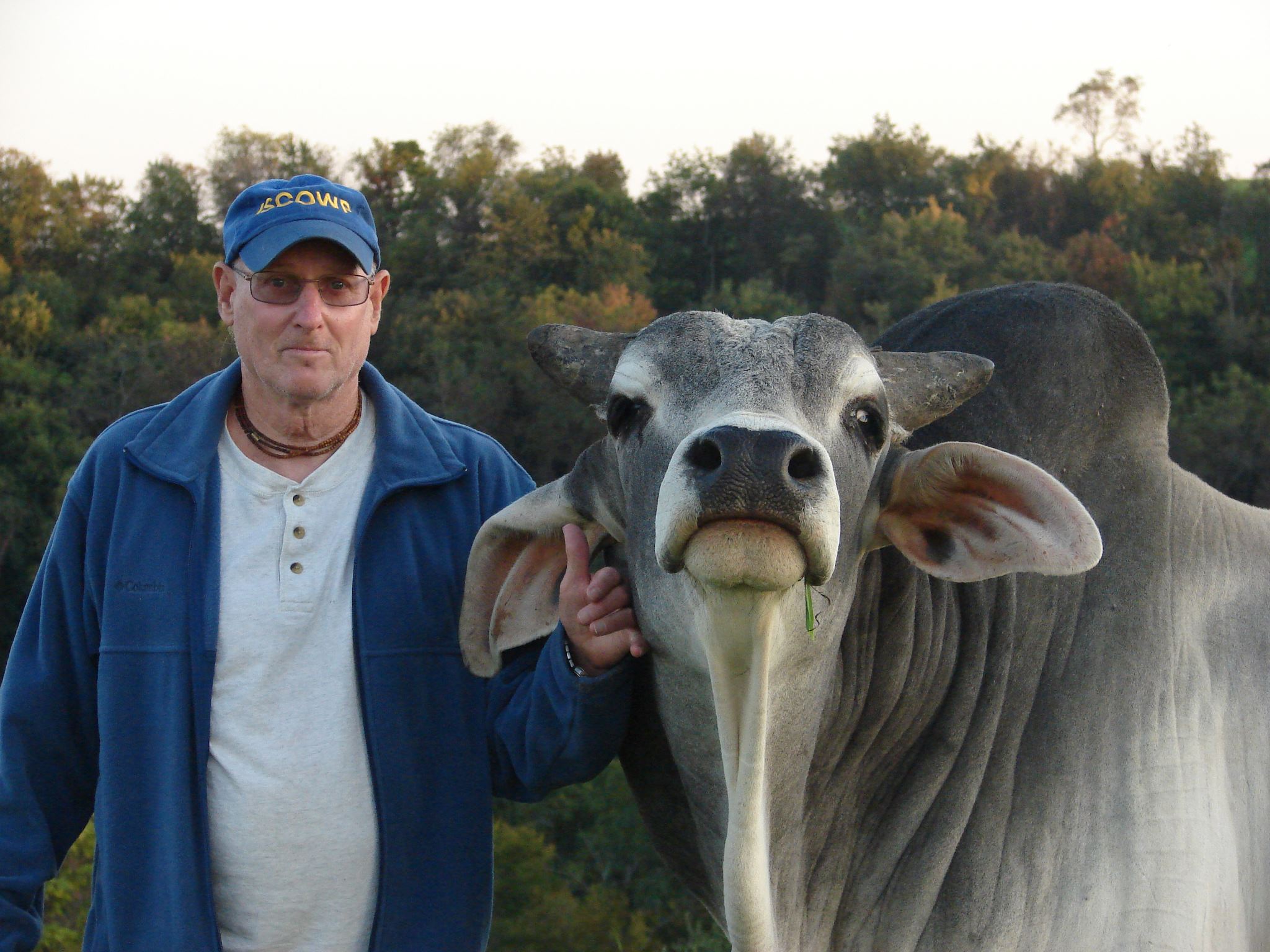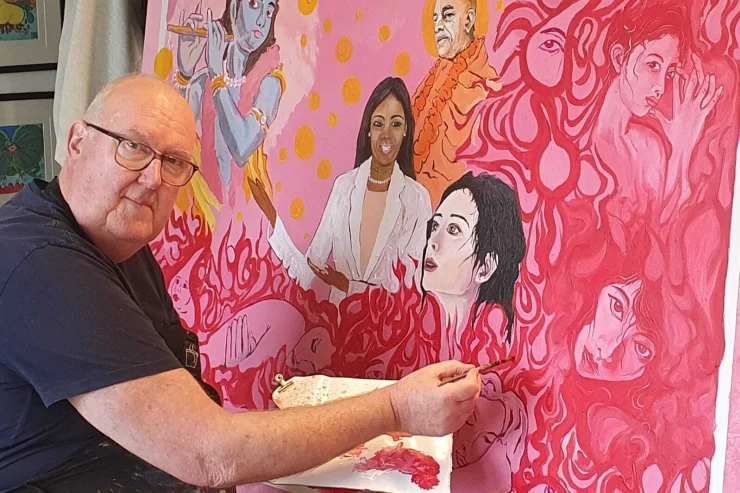ISCOWP Cares for Krishna’s Dearmost Friends
By Madhava Smullen | Авг 10, 2012

There are some devotees who are so dedicated to their service to Krishna, sticking to it year in and year out whatever struggles they encounter, that they inspire everyone else to do more too.
With Lord Krishna’s appearance day, Janmastami, just passed on August 9th, it’s especially enlivening to look at one of these devotees who takes care of Krishna’s dearmost friends, the cows.
Balabhadra Dasa, who runs the 501 (c)(3) charity organization ISCOWP—International Society for Cow Protection—has protected cows from slaughter and trained oxen for decades, pushing on despite major health difficulties.
In December 2008, he suffered a heart attack, after collapsing several times due to back pain and such severe leg pains that he couldn’t walk. Recovering from this, he contracted Gullian Barre Syndrome in March 2011, which almost completely paralyzed him within 48 hours.
Now 66, and on the way to recovery yet still having only thirty to forty per cent use of his hands, Balabhadra still works with the cows every day on his farm in West Virginia, USA.
Joining ISKCON in 1969, Balabhadra learned about the importance of protecting cows from the society’s founder Srila Prabhupada, who propounded a life of simple living and high thinking, and explained that the cow is the mother and the bull the father of humankind.
But it was in the 1970s, while working on a commercial dairy farm for four years, that the realization of just how important cow protection really was sank in for Balabhadra.

Weaving in and out of the poles is like walking in between trees in the forest and will train the teamster ox how to manuver in a tight situation.
“It was a typical exploitive operation,” he says. “We were milking 256 cows, who were bred to have babies so their milk supply could be kept up. Meanwhile the babies were simply raised for the meat industry. It was a huge eye opener for me.”
Armed with a clear picture of how not to keep cows, Balabhadra spent ten years, from 1980 to 1990, at Gita Nagari in Pennsylvania, one of ISKCON’s first rural communities. Coached by temple president Paramananda Dasa, he trained a team of fourteen oxen to work on the farm there.
In 1990, Balabhadra and his wife Chayadevi incorporated ISCOWP, with a mission to educate people about ox training and organic agriculture, as well as to show practical application of Srila Prabhupada’s teachings on cow protection.
For five summers, they travelled with Festival of India with a team of oxen, setting up cow protection booths at Hare Krishna cultural events all over the USA.
“We wanted people to actually see, face to face, where their hamburgers were coming from,” Balabhadra says. “It definitely made an impression on people, and made them go a little deeper in their thought process.”
After living in North Carolina for several years, Balabhadra and his wife moved in 1995 to Wheeling, West Virginia, where they purchased a farm for ISCOWP next to the ISKCON community of New Vrindaban.
In 1998, ISKCON’s Governing Body Comission recognized Balabhadra’s work by asking him to be the ISKCON Minister of cow protection and agricultural development. Under this post, he traveled all over the world to India, Germany, England, Belarus, Lithuania, Russia, Ukraine, Serbia, and other countries, helping devotees to develop rural communities based on Krishna conscious principles.
In his classes and seminars, Balabhadra highlighted two main points that he felt were important for ISKCON members to take note of. The first was that a cow protection project is only fifty per cent successful if it’s only taking care of cows and not oxen too.
“In a human family, the mother traditionally takes care of the children and the household, while the father works and supplies necessities,” says Balabhadra. “But historically, if the father’s not working, then there’s poverty. Similarly, the cows have calves and provide milk for sustenance. But if the bull is not ploughing the fields and providing food grains, then there’s poverty in both the cow and human families. The bull and the man, the two fathers, should work side by side to provide the necessities for the family.”
The second point often made by ISCOWP is how urgent they feel it is that ISKCON stop patronizing commercial dairy products, and instead purchase milk from devotee or other non-violent farmers.
“Cow protection means that we’re actually protecting the cows, not just talking about it,” Balabhadra says. “Often in ISKCON today, we purchase milk cheaply at the supermarket, thinking that we don’t have to have a farm and protect cows because they’ll get the benefit of our offering their milk to the Deities. But it’s blood milk; tainted by violence.”

A baby boy gets introduced to the cows for the first time
If you trace back where the milk has come from, Balabhadra explains, you’ll find cows that have had their babies taken away, been milked with machines, fed hormones to make them produce more, and then sent to the slaughterhouse when they can’t give milk anymore. “These greatly sinful acts,” Srila Prabhupada writes in his purport to Srimad-Bhagavatam 1.17.3, “are responsible for all the troubles in present society.”
“We’re not advocating that ISKCON become vegan,” Balabhadra says. “But we’re asking that devotees don’t support the commercial dairy industry.”
There are other ways that Balabhadra feels ISKCON can improve its cow protection. One is more support and recognition of devotee advocates, such as Spiritual Economics author and teacher Dhanesvara Dasa, who holds regular conferences on cow protection and simple living in Eastern Europe.
Another is to change the limiting belief that putting energy into rural communities means losing manpower from city temples. Rather, Balabhadra feels that both can support each other, citing Prabhupada’s wish that every city temple should have a rural community connected to it to supply dairy products, grains, flowers, vegetables and fruits for the Deities.
“If you analyze it, cows—Krishna’s dearmost friend, even above the brahmanas—are at the center of Prabhupada’s simple living, high thinking vision,” he says. “So all devotees know that cow protection is important. But often we’re caught out when the public tell us, ‘What you’re saying is very nice. We’d like to get milk from protected cows, and organic fruits and vegetables. Where is your local farm?’ So we have to not only philosophize about cow protection, but also live it.”
Balabhadra, the first to set an example for what he’s most passionate about, does live it. Despite resigning from his position as ISKCON’s cow protection minister this year due to health difficulties, he still runs ISCOWP’s 168-acre organic farm, taking care of twenty cows and oxen daily.
The farm, just four miles from ISKCON’s New Vrindaban temple, also doubles as a training center, where visitors are provided accommodation and can learn how to work with oxen. They are also taught how to dehydrate, can and preserve food grown in ISCOWP’s one-acre garden, including kale, Swiss chard, comfrey, tomatillos, beans, and tomatoes.
Meanwhile, Balabhadra and his wife continue to travel and teach. They brought a cow protection booth to the recent Rathayatra festival in Toronto, and will be giving a three-day seminar on organic gardening and animal husbandry in Hawai on August 21st, 22nd and 27th.
Doctors tell Balabhadra he should allow up to three years to come back from the paralyzing Gullian Barre Syndrome he contracted in March 2011, so he’s hopeful that he’s now halfway down the road to full recovery.
Until then, every day’s a struggle. But that won’t stop Balabhadra.
“Krishna is allowing me to slowly redeem my health so that I can continue to push on,” he says, “Making protection of cows and bulls the priority in my own life, as well as helping devotees and non-devotees alike to understand its importance.”















